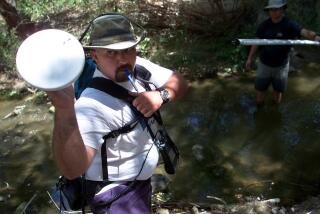Writer Stands in Awe of the Courageous
- Share via
WASHINGTON — Stephen Ambrose looks grumpy. He wears the wary, uncomfortable look of a dyspeptic grizzly leaned out by a long winter, hungry for meat and sunlight. It’s not clear just what he’s got to be annoyed about. He recently has had two books on the bestseller list at once, which happens to Stephen King and Danielle Steel but not often to historians.
“Citizen Soldiers,” the GI’s view of World War II in Europe from D-Day to the surrender of Germany, is his 19th book. “Undaunted Courage,” detailing the Lewis and Clark saga he seems to care the most about, has been on the lists for more than a year now. Ambrose is getting seven-figure royalty checks at a time when his kids are grown, his mortgage paid off and he’s retired from the University of New Orleans with a pension.
So why do his eyes keep darting frantically around the restaurant as if checking for exits?
Maybe it’s Washington.
“The men I admire most are soldiers, sailors, professional military. Way more than politicians,” he growls, reaching warily for the bread as if it might be poisoned.
“I come away from those career military guys feeling great about our country and the world. I come away from interviewing politicians and it’s all down. It’s all lies, fabrications, spin and self-serving. The military is very different and very special . . . the best of America.”
Not everybody in academia feels that way. Ambrose recently tried to give the University of Wisconsin, his alma mater, $250,000 to found a chair in military history, but the university isn’t sure it wants the cash.
“They don’t think anything military is worth teaching,” Ambrose scoffs. “All the professors came of age in the ‘60s and ‘70s, and all they know is Vietnam, Vietnam, Vietnam. They have literally no conception of World War II.”
World War II is rarely far from Ambrose’s mind. It shaped the cultural and historical context of his 1940s boyhood in Wisconsin. It shaped his multivolume effort as Dwight Eisenhower’s chosen biographer. He’s written eight books about the war.
Yet Ambrose has never served in the military, which causes him, he says, “a certain amount of shame. I interview men still carrying shrapnel around, and what have I done for my country of comparable worth? It’s almost embarrassing.”
Sitting there glowering in his tweed sport coat and the tie with little buffaloes on it, his eyes as piercing blue as the Montana skies he loves, Ambrose, 62, looks like some sort of right-wing recruiting poster for the American dream. In fact, he says, he was once a card-carrying member of the Socialist Party with a particular loathing of Richard Nixon.
Yet his respect for the American military was constant even then. He had all but signed up for the Navy after high school in 1952, then “Ike made peace in Korea.” Instead of basic training, he chose college in Madison, where later, in graduate school, he became a dedicated Marxist.
But he found that history as ideology caused him problems. He’d always been fascinated with the Civil War, and the Marxist model of capitalist exploitation and class warfare “just doesn’t explain much about that war . . . .
“At the pivotal points in the war, it was always the character of individuals that made the difference. Suppose Joshua Lawrence Chamberlain hadn’t held the line at Little Round Top? Suppose Lee had listened to Longstreet and not launched Pickett’s Charge but, instead, had moved his army between Meade and the city of Washington? Marx is no help at all with things like that. Nor could he explain Stonewall Jackson. So I lost my youthful faith.”
He doesn’t seem to miss it. In fact, he seems to have parted philosophical company with ideology and academia long ago.
Part of that was due to Eisenhower. Ambrose’s second book was a biography of Abraham Lincoln’s chief of staff, Henry Wager Halleck, a Civil War general whom Ambrose admired but realized was far from a household name. To his astonishment, Ike turned out to be a Halleck admirer as well. He read Ambrose’s book shortly after it came out in 1962, got in touch with the 27-year-old author and invited him to edit the Eisenhower papers.
“If there was anything left of my Marxism, my long hours with Ike wiped it out,” Ambrose said. “He was a perfectly wonderful person: the greatest man I’ve ever known. I just loved him.”
The greatest single thing he learned from Eisenhower, Ambrose said, was “never to question a man’s motives. [Ike] would frequently question someone’s wisdom, but he taught me that you never really know what someone’s motives are. It was a great lesson.”
But it’s a lesson rarely learned in Washington, he says, where questioning motives often appears to be the national pastime. The city, he says, is sort of like Nixon--”He was obsessed with guessing people’s motives. And he always assumed they were as base as his own.”
Against all his instincts and prejudices, Ambrose wrote three books on Nixon and ended up, he said, with a grudging respect for him as a leader, if not as a man.
Ambrose taught history for 30 years at the University of New Orleans. The choice of venue was entirely emotional, he says.
“I went down there one spring vacation during college and just fell in love with that old bag of bones of a city,” he says. He’s still in love with it, he says, though he’s now moved east to Bay St. Louis, Miss. But his love affair with academic history has cooled.
“Academic history has lost the power of the narrative,” he says mournfully. “It’s lost its audience. And they don’t even know it. Their audience is 18-, 19-year-old Americans. And those kids come into the classroom and look up at you and say, ‘Tell us about our heroes and what did they do?’ And they don’t get any answer from academic historians. And as a consequence, the kids don’t take history courses. And as a consequence of that, history departments go down in size. And the aggrieved professors never figure out why.”
*
If there are drawbacks to life in academia, there are three huge benefits, Ambrose says: They’re called June, July and August. It is during those months for the last 21 years that he’s packed his kids and grandkids into the station wagon and headed to Montana to pursue his lifelong fascination with the Lewis and Clark expedition after reading the Lewis and Clark journals in 1975.
“Through the late spring of 1976, we made our way up the Missouri River, camping at Lewis and Clark campsites in Missouri, Kansas, Iowa, Nebraska and the Dakotas,” he writes in “Undaunted Courage.”
On the nation’s 200th birthday, they were at Lemhi Pass, where Lewis became the first white man to cross the Continental Divide.
“You could reach out and touch the stars,” Ambrose wrote. “It was the most wonderful night of our lives.”
He has returned with his family to Lemhi Pass almost every year since, he says, and “the experience has brought us together so many times . . . that we cannot measure or express what it has meant to our marriage and our family.”
These days, Ambrose is Mr. Lewis-and-Clark: chief source for the recent Ken Burns PBS television special on the subject and now a benefactor of the Lewis and Clark Museum. Tourists entranced with his book are rediscovering American history and flocking to the Missouri River country. That, says Ambrose, is the finest tribute they could pay him.
More to Read
Sign up for our Book Club newsletter
Get the latest news, events and more from the Los Angeles Times Book Club, and help us get L.A. reading and talking.
You may occasionally receive promotional content from the Los Angeles Times.









